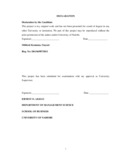| dc.description.abstract | The purpose of this study was to investigate the inventory management practices on operational performance in Non-governmental organizations in Kenya. The research objectives were to establish inventory management practices used by NGOs in Kenya, to determine the relationship between inventory management practices and operational performance of NGOs in Kenya and to establish the challenges faced by NGOs in the implementation of inventory management practices. This study was carried out through a descriptive research design. This study targeted 10 NGOs within Nairobi County. Stratified sampling design was used to sample the NGOs within Nairobi County. The sample size was 70 respondents. Data was analysed using descriptive statistics with the use of Statistical Package for Social Sciences (SPSS). This study established that a unit increase in ABC Analysis would lead to increase in operational performance of NGOs by a factor of 0.683, a unit increase in Economic order quantity would lead to increase in operational performance of NGOs by a factor of 0.702, unit increase in Vendor managed inventory would lead to increase in operational performance of NGOs by a factor of 0.793, a unit increase in Demand focus inventory would lead to increase in operational performance of NGOs by a factor of 0.699 and a unit increase in Automatic replenishment would lead to increase in operational performance of NGOs by a factor of 0.612. Vendor managed inventory was found to have more effect on operational performance of NGOs in Kenya compared to other inventory management practices studied. The study concluded that Effective inventory control management is recognized as one of the areas management of any organization should acquire capability. The ability of any organization to evolve effective inventory control management system will depend on the extent to which it perceives the benefits it stands to gain from such program. In general the findings that emerged from this study have indicated that NGOs stand to gain a lot from effective inventory control management system. Some of this benefit include optimal use of resources, cost reduction, improved profitability, improved sales effectiveness, reduction of waste, transparency and accountability, easy storage and retrieval of stock, high inventory utilization amongst others. The study recommends that NGOs adopt proactive attitudes towards the issue of proper inventor management practices. Being proactive requires maintenance of the right level of inventory at any point in time. The NGOs should avoid the dangers that are inherent in keeping too little or too much of stock. The study recommends that NGOs adopt the inventory keeping method that best suits their operation. Here, vendor managed inventory could be considered as an option as it has been proven to be effective in maintaining the right level of inventory and also prevent stock-outs. There is also the need for organizations to train their personnel in the area of inventory control management. Best practice inventory management software should be deployed by firms as a reliable strategy for managing the rising cost of the holding stock. This may involve training employees on the usage of the software, or by acquiring the services of external system consultants. | en_US |

